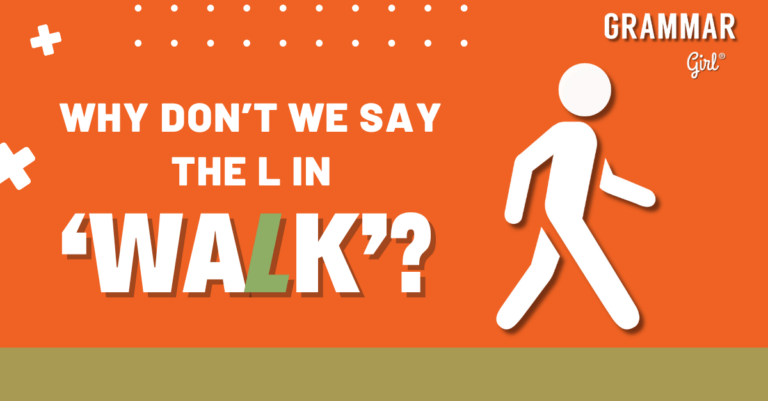Today we’re answering an intriguing question from a listener named Michael, who asks, “Why do we drop the L in words like ‘almond’ and ‘chalk’?”
This is one of those language mysteries that reveals how words evolve over time. You might not have noticed, but those of us who speak English treat the letter L in some interesting ways. Sometimes we say it, sometimes we don’t, and sometimes it depends entirely on where you grew up.
So let’s start with a quick experiment. Listen to me say these words: “walk,” “talk,” and “half.” Did you notice that even though all these words have an L in their spelling, I didn’t pronounce them. Most of us don’t pronounce it at all in these words.
Regional differences in L pronunciation
But here’s where things get really interesting — words like “calm,” “palm,” and “almond” create a divide among English speakers. If you’re from Britain, you probably don’t pronounce the L in “calm” or “palm.” But if you’re American or Canadian, you might find yourself emphasizing that L sound. And “almond”? Well, that depends not just on your country but often on your specific region. Some Americans give it a soft L sound, while others skip it entirely. I happen to be one of the speakers who pronounces the L: “almond,” which is why I might have sounded awkward trying not to pronounce it when I read Michael’s question.
What’s the difference between light and dark L sounds?
Now let’s get a little more technical. In English, we actually have two different types of L sounds — what linguists call a “light L” and a “dark L.” Think of them as linguistic siblings with very different personalities.
The “light L” is what you hear at the beginning of words like “light” or “leaf.” Your tongue touches right behind your top teeth, and the sound feels bright and crisp.
But the “dark L” is the sound you hear at the end of words like “ball” or “feel.” Your tongue still touches the same spot, but it also bunches up in the back of your mouth, giving the sound a deeper, more hollow quality. If you say “leaf” and then “ball” slowly, you can actually feel the difference!
Why do we pronounce L words differently?
Here’s where our story takes an unexpected turn. That dark L sound is pretty unusual in the world’s languages — it’s actually one of the trickier sounds for non-native English speakers to master. And because it’s such an unstable sound — that is, one that’s difficult to pronounce the same way consistently — it tends to transform over time. Think of it like a linguistic game of telephone: as the sound gets passed from generation to generation, it gradually shifts into something easier to pronounce.
This is exactly what happened with words like “walk” and “talk.” That dark L started transforming into more of a vowel sound — like a subtle “oo” — or into a W [double-U]. Linguists call it “L-vocalization,” and you can hear it in action when someone says “milk” more like “miwk” or “bell” like “bew.” This is especially common in certain accents, like Cockney English in London or some dialects in Philadelphia.
When the silent L appeared
So why do we have all these silent L’s hanging around in our spelling? The answer takes us back to the 1400s. Around this time, English speakers started changing how they pronounced L’s that came after vowels. Some of these L sounds turned into something more like a W sound, and others disappeared completely. But the spelling stayed the same.
Think of it like a linguistic family photo album. The spelling preserves how these words used to sound, even though our pronunciation has moved on. It’s similar to how we still write “knight” with a K and GH, even though we stopped pronouncing those sounds centuries ago.
Recent changes to the pronunciation of words with the letter L
But there’s another twist in our story. Remember how I mentioned that some Americans pronounce the L in “calm” and “palm”? That’s actually a relatively recent development. Linguists call this a “spelling pronunciation” – when people see a letter in the written word and start pronouncing it, even though it was traditionally silent. It’s like linguistic peer pressure from the written word!
So the next time you’re listening to different English dialects you can think about how you’re hearing living proof that languages evolve. These sound changes aren’t mistakes or lazy speech; they’re windows into the fascinating ways our brains and mouths work together to make language easier to use.




